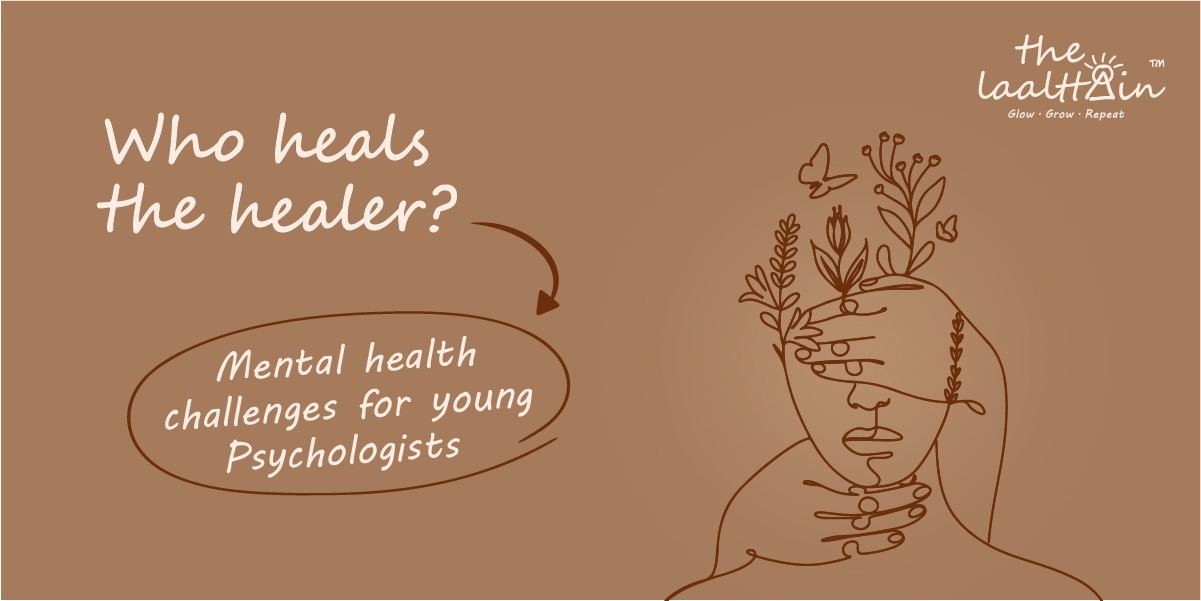
Hello my lovely Luminer!
Imagine stepping into a field where you’re expected to heal others’ emotional wounds while barely knowing how to process your own. That’s the reality for many young psychologists, or what I like to call “baby psychologists,” freshly stepping out of their Master’s programs and into the emotionally demanding world of mental health practice. Recently, I’ve observed a concerning trend: many of these young professionals are grappling with their own mental health issues—stress, anxiety, and even depression—as they navigate the early stages of their careers.
My observation got me reading into surveys and data, and this isn’t just anecdotal. Research and international data confirm the emotional toll on early-career mental health professionals. In India, this problem is compounded by a lopsided demand-to-supply ratio and a lack of structured support systems. Let’s dive deeper into what’s causing this, what the data says, and how we can address this issue.
What the Research Says
- International Data: A 2020 British Psychological Society survey found that 49% of psychologists experience depression, anxiety, or stress in their first five years of practice. Similarly, a study published in Frontiers in Psychology (2021) revealed that 58% of early-career Australian psychologists reported emotional exhaustion.
- Burnout Risk: According to the APA, nearly 46% of early-career psychologists in the U.S. report moderate to high stress due to emotional labor, financial strain, and lack of mentorship.
- India’s Context: While there’s limited large-scale empirical data specific to India, anecdotal evidence and internal surveys from universities and clinics show that young psychologists here face heightened challenges due to inadequate supervision, societal stigma, and low financial compensation.
Demand-Supply Imbalance in India
Rising Demand for Mental Health Professionals: With growing awareness around mental health, the demand for psychologists in India has skyrocketed. Yet, the country has just 0.75 psychologists per 100,000 people compared to the WHO’s recommended ratio of 1:10,000.
Pressure on Fresh Graduates: This gap often means young psychologists are thrown into the deep end with heavy client caseloads and little preparation, making them vulnerable to burnout and emotional exhaustion.
Financial Strain: Entry-level psychologists in India often earn low salaries, which adds to their stress, especially when coupled with the societal expectation that they’re “sorted” because they’re in the mental health field.
Personal Observations
From my own experience as a psychologist and mentor, I’ve noticed:
Empathy Fatigue: Fresh graduates often over-identify with their clients’ struggles, leading to emotional drain.
Imposter Syndrome: Many young psychologists feel they aren’t equipped enough, despite rigorous training.
Isolation: Without proper peer or supervisory networks, they feel alone in managing complex cases.
Unresolved Personal Issues: Their own unresolved emotional challenges often surface while dealing with clients, adding to their mental load.
Internal and External Expectations: Young psychologists face the burden of being expected to know how to manage not only their own emotions but also those around them, simply because they are psychologists. This profession, like that of medical doctors, takes years to master and requires constant learning and adaptation.
Solutions: How Can We Support Young Psychologists?
- Structured Supervision: Ensure that every early-career psychologist has access to regular supervision to process their cases and emotions.
- Peer Support Networks: Encourage professional associations and universities to create peer groups for new psychologists to share experiences and challenges.
- Affordable Therapy Access: Promote a culture where psychologists can seek therapy themselves without stigma.
- Self-Care Training: Integrate self-care modules into academic programs to prepare students for the emotional labor of practice.
- Financial Support: Advocate for fair compensation for entry-level psychologists to reduce financial strain.
- Professional Development: Offer continuous learning opportunities to build their confidence and skills.
- Realistic Expectations: Set practical and clear expectations for what life as a professional therapist looks like. Deglamorize the field and reduce the “fuss” around being a psychologist to help fresh graduates understand the challenges and rewards realistically.
Prriyanka’s Bonus Insights
It’s OK to Seek Help: Remember, being a psychologist doesn’t mean you’re immune to emotional struggles. Seeking therapy for yourself is a sign of strength, not weakness.
You Can’t Pour from an Empty Cup: Make self-care a non-negotiable part of your routine. Think of it as recharging your battery so you can show up fully for your clients.
Normalize Vulnerability: Let’s create a culture where it’s okay for psychologists to say, “I need support too.”
Be the Change: If you’re an experienced professional, offer mentorship to young psychologists—your guidance could make all the difference.
Conclusion
The journey of a psychologist is deeply rewarding, but it’s also emotionally demanding. For young psychologists, the early years are a steep learning curve. At The Laalttain, we believe in shedding light on these challenges and finding solutions. By acknowledging the hurdles and supporting our budding professionals, we can ensure that the caregivers of society are cared for too. Let’s start this much-needed conversation for the future of mental health in India. Reach out to us at hello@blue-goldfish-115083.hostingersite.com if you’d like to share your story or collaborate.
– By Prriyanka Kharrb
Light ‘En’ Light
References:
- British Psychological Society survey (2020): Found 49% of early-career psychologists experience significant stress and burnout.
- American Psychological Association: Reports early-career psychologists face moderate to high stress due to emotional labor and lack of mentorship.
- WHO Guidelines: Recommends a ratio of 1:10,000 mental health professionals; India has only 0.75 psychologists per 100,000 people.
- Frontiers in Psychology (2021): Found 58% of early-career Australian psychologists reported emotional exhaustion.
- Times of India: Highlights India’s shortage of mental health professionals with 0.75 psychologists per 100,000 people compared to the WHO recommendation.
- McKinsey Health Institute: Survey shows 59% of Indian employees experience workplace burnout, the highest globally.

